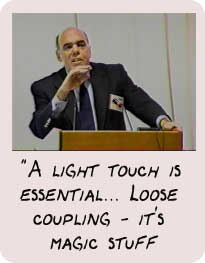|
|
Katalina Groh, Larry Prusak: Some of the world's leading thinkers |
| Storytelling: Organizational Perspective: Larry Prusak |
 |
The
'light overseeing' of communities
ďHave any of you had the charming
experience of trying to manage a birthday party for eleven-year-old boys?Ē
Iíve done this. I mean, there is a lot of ways that you can go about it.
But if you try a top-down strong-control approach, it doesnít work. But
you can see what boys naturally will do, if you give them a little tools,
a little time, a little space, a little light overseeing. Light overseeing
works reasonably well.
|
| You all know this. I know it. Iím not
that stupid. Youíre not either. So I donít touch it with a barge pole,
but they do try to do this stuff.
And one of the things that they often try to do in big companies is to organize communities, force them together. Well, I'm sorry, it doesnít work. There are communities, but they donít want to do, and what many large firms donít want to do, Iíd add a whole bunch of firms to this list Ė is give the staff any time and any space and any money. That they hate. Thatís worse than the plague. So they think you can just organize and erect it and have conscious goals, rather than: let them self-organize. What Karl Weick calls ďloose couplingĒ. Itís magic stuff. Loose coupling. I think itís just as good for raising kids as it is for working in organizations. Finding who knows what So connectivity is really
important. People self-organize. How do they find each other? They do.
How do kids find each other? How do you find partners in life? We find
each other. Stories. Shared passions. Some lizard-brain type of activity
where you find people who share likes and dislikesÖ This stuff is real.
Thatís how we find each other. We find each other, and people find each
other in organizations.
Communities One of the great achievements
of the knowledge movement was to get the fact acknowledged that human beings
individually, in organizations, is not the unit of analysis for knowledge.
This is a big step forward. And it goes against Microsoft and IBM and firms
that try to push that individualistic viewpoint, because they are selling
individualized technology. They think thatís the right unit. Theyíre wrong.
The right unit for managing knowledge in organizations is the group. Itís
not an individual. Individuals donít do much. The smartest ones donít.
The stupidest ones donít. They group together and form a common mean.
|
| Books and videos on storytelling *** In Good Company : How Social Capital Makes Organizations Work by Don Cohen, Laurence Prusak (February 2001) Harvard Business School Press *** The Social Life of Information, by John Seely Brown, Paul Duguid (February 2000) Harvard Business School Press *** The Springboard : How Storytelling Ignites Action in Knowledge-Era Organizations by Stephen Denning (October 2000) Butterworth-Heinemann *** The Art of Possibility, a video with Ben and Ros Zander : Groh Publications (February 2001) |
| The views expressed on this website are those of Stephen Denning, and not necessarily those of any person or organization |
| Site optimized in 800x600: webmaster CR WEB CONSULTING |
|
|
|
|